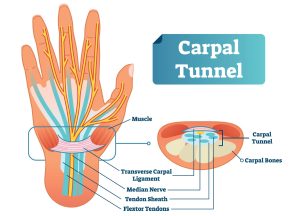As more people spend large portions of their day hunched over a computer keyboard tapping away, there’s been an increase in complaints of hand numbness, pain, tingling, and weakness. Are you one of these people who is suddenly experiencing strange pains or sensations in your hand? If so, you could have Carpal Tunnel Syndrome.
If you live in the New York City area, a visit to Downtown Pain Physicians can help. Our trained and award-winning physicians use state-of-the-art diagnostic tools to determine the underlying cause of your symptoms. If you do have carpal tunnel syndrome, they’ll help you understand the condition and what can be done to alleviate the pain, numbness, tingling, and weakness that you’re experiencing.

Carpal Tunnel Syndrome in Downtown Brooklyn & Lower Manhattan
First, it’s important to understand what your carpal tunnel is. The carpal tunnel provides a pathway for your median nerve to run from your forearm down, into your hand. That nerve is very important because it provides sensations to your palm, thumb and all of your fingers except that little pinkie finger. It also plays a big role in your ability to move your thumb.
Book Appoinments
212.404.8070What’s Happening When You Have Carpal Tunnel Syndrome?
Any compression or irritation to your median nerve in the carpal tunnel or area around it can bother the nerve and cause you to have symptoms. The symptoms vary because the level of compression or irritation can be different and so the response changes from person to person. Some people who have carpal tunnel syndrome in both hands have different symptoms in each hand because of the level of compression.
What Does Carpal Tunnel Feel Like?

Interestingly, because the symptoms feel differently for different people, it can be hard to pinpoint what’s causing your pain without seeing a physician. When individuals first begin noticing carpal tunnel symptoms, they often complain of numbness in their fingers or the palm of their hand, some have pain with movement or repetitive actions. Other people first notice a feeling of weakness and an inability to grasp as well as they had previously.
Many times, the symptoms are first felt upon waking in the morning. It’s thought that the bending your wrists during sleep and holding them that way for a long period of time puts pressure on the median nerve. This leads to hand pain, tingling, numbness, and weakness upon rising in the morning. These symptoms can go away during the day, but as your condition worsens the symptoms become more persistent and occur throughout the day.
Symptoms of Carpal Tunnel Syndrome
Is the pain you’re feeling carpal tunnel syndrome or is something else happening? Before seeing one of our doctors, check to see if you’re experiencing any of these symptoms. Remember that early care can prevent the condition from worsening and stop carpal tunnel symptom progression.
- Numbness, tingling, and pain in your hand, especially around the thumb and closest fingers
- A burning sensation in your hand or one that travels up your arm
- Wrist pain during the night and when you wake
- Feeling like you need to shake your hands to wake them up in the morning
- Weakness in the hand or an inability to grasp items firmly
- Less mobility in your thumb
- A feeling of electric shocks in your fingers, thumb or one that travels up your arm
- Wrist pain
What Causes Carpal Tunnel Syndrome?
While repetitive actions, like typing on a computer can cause someone to develop carpal tunnel syndrome, there are many other ways you can develop this condition. This is one of the things that can make self-diagnosis difficult and why it’s so important to seek professional help.
- Diabetes
- Thyroid dysfunction
- Fluid retention due to pregnancy or menopause
- High blood pressure
- Rheumatoid arthritis
- Other autoimmune disorders
- Wrist injuries
- Repetitive motion injuries
- Prolonged exposure to vibrating equipment
Carpal tunnel syndrome can come from a combination of issues, especially if one or more of them causes inflammation or obstructed blood flow to the wrists and hands.
Carpal Tunnel Syndrome Risk Factors
Wondering if you’re at a greater risk of developing carpal tunnel syndrome? There are some risk factors that might not directly cause you to develop this syndrome, but they can contribute to it and increase the odds of you having damage or irritation in this region.
- Women typically have more occurrences of carpal tunnel than men, perhaps it’s simply due to having smaller bone structure to begin with.
- Diabetes can increase your odds of getting nerve damage anywhere in your body, but of course your median nerve is vulnerable.
- Inflammatory conditions. Most often, rheumatoid arthritis is associated with carpal tunnel syndrome, but any condition that causes inflammation can create pressure around your median nerve.
- Anatomical issues. If you have an injury or issues from birth that have caused narrowing of your carpal tunnel, you’re definitely at risk to develop this condition. Even simply being born with small carpal tunnel openings can cause pain.
- Studies have shown that a breast cancer drug has been linked to carpal tunnel, which means there may be other medications that cause this issue.
- The more you weigh, the more pressure there is throughout your body and that can include your median nerve.
- Fluid retention. If you’re retaining water due to menopause, pregnancy, and even some medications, that also puts pressure on your body and can irritate the median nerve.
- Repetitive motion. Doing the same thing over and over can wear on your bones and your joints and cause repetitive motion issues, including carpal tunnel. This is why typing on a computer can be a concern.
- Workplace factors. In addition to repetitive motion issues you may face at work, any job that requires repetitive wrist flexing and even long sessions of vibration (like a jackhammer) can cause carpal tunnel syndrome.
Diagnosing Carpal Tunnel Syndrome
A visit to one of our doctors will help you determine if you have carpal tunnel syndrome. The visit will begin with a complete history of your symptoms. The doctor will then perform a physical examination and nerve conduction studies to check for nerve pressure, tenderness, swelling, and any possible deformities. They will also check for strength and sensation.
An x-ray cannot see if there is narrowing of the carpal tunnel, but it can be a great diagnostic tool if your doctor suspects arthritis or a fracture might be involved.
Electromyography is another test that can be very useful in determining if you have carpal tunnel concerns. This test measures electrical activity present in your muscles when they rest and contract. It’s very useful in determining if muscles controlled by the median nerve have any damage.
Similarly, a nerve conduction study can be performed by taking electrodes to your skin and passing a shock through the median nerve to see if the electrical impulses are slowed. This test can diagnose carpal tunnel syndrome and might be able to rule out some other conditions, too.
-
“VERY KIND”
Dr. Raval is very kind and explains everything in layman’s terms, which is super helpful. Thanks so much, guys! 🙂
-
“PLEASANT AND PROFESSIONAL”
Best doctor visit I ever had. Staff was pleasant and the doctor was very pleasant and professional. Took his time and answered all my questions.
Treatments for Carpal Tunnel Syndrome
If you are able to get to a doctor early on, when your symptoms first present, you might be able to receive non-surgical therapy that can relieve your symptoms. But the longer your wait, the more likely you are to need surgery in the future. Some of the treatment options available to you include:
- Nonsteroidal anti-inflammatory drugs or NSAIDS
- Physical therapy (link to PT page)
- Wrist splinting and bracing
- Ultrasound-guided median nerve injections
- Endoscopic surgery
- Open surgery
If your carpal tunnel syndrome symptoms are caused by an underlying medical condition like a fracture, diabetes, or an autoimmune disorder, you can expect that your doctor will also want to begin treating that condition so you have the best results possible and are as healthy as can be.
Preventing Carpal Tunnel
If you’re worried that you might be at risk for carpal tunnel syndrome, you can begin taking some preventative measures that can increase your odds of avoiding this painful condition.
- Relax your hands. If you tend to type or write with tension in your hands, relaxing and being more gentle can help.
- Take breaks. Instead of doing marathon sessions or work or gaming or whatever it is, make sure to give yourself a break for a few minutes regularly. Let your hands, wrists, and arms relax.
- Stretch and move. Some gentle stretches and moving can help increase circulation to your hands and relieve tension.
- Watch wrists. Try to keep your wrists straight and relaxed, a bend that’s either too far upward or downward puts pressure on your median nerve.
- Check your posture. Your posture can affect everything, even your hands and wrists.
- Avoid or change your mouse. The computer mouse is tied more closely to carpal tunnel syndrome than the keyboard itself. If you can’t learn to live without one, try a different style.
- Stay warm. Cold temperatures can exacerbate carpal tunnel syndrome, so fingerless gloves are a great solution.
If you have some of the symptoms of carpal tunnel syndrome, a visit to Downtown Pain Physicians can determine if median nerve impingement or irritation is the cause and you can begin a treatment plan immediately to relieve your pain and get you feeling back to normal again. Remember, early diagnosis is a critical part of a successful outcome and our doctors are here to help guide you back to health.
-
Dr. Raj Raval, M.D.
- Board Certified
- Interventional Pain & Musculoskeletal Medicine Specialist
-
Education & training
- SUNY Health Science Center
- Rutgers University Fellowship
-
Dr. Raphael Jaramillo, MD
- Board Certified
- Interventional Pain & Musculoskeletal Medicine Specialist
-
Education & training
- Touro College of Osteopathic Medicine
- New York University
- Rutgers University

